10 Best Foods to ‘Detox’ Your Body Naturally
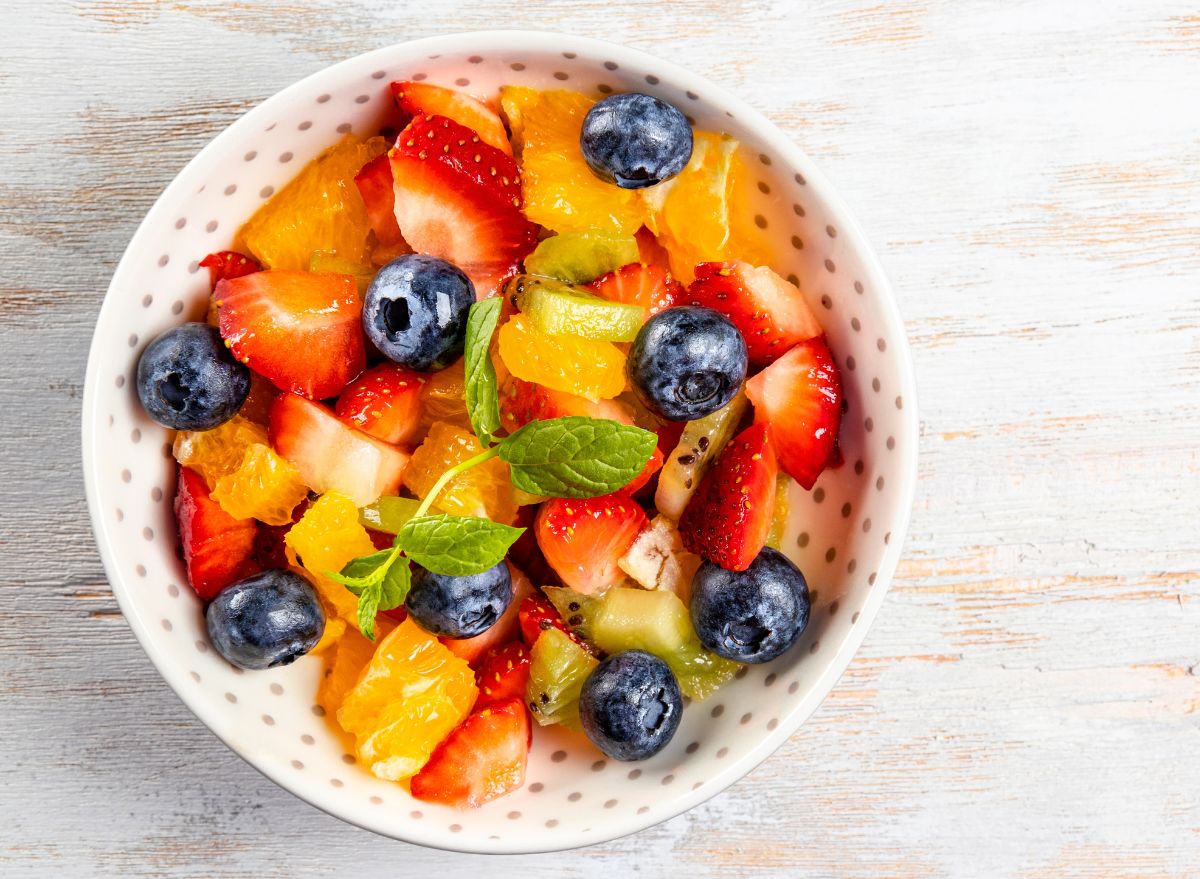
Over the years, we have seen our fair share of detox waters, teas, diets, and pills. Aimed to help the body rid itself of toxins, things that claim to detox our bodies are appealing to those who want to live a “cleaner” lifestyle.
A detox diet, often simply termed “detox,” refers to a short-term dietary intervention designed to eliminate toxins from the body. A detox can include a period of fasting, followed by a rigorous diet of fruit, vegetables, fruit juices, and water. Some detox diets also incorporate teas, supplements, and cleanses to aid the detoxification process. The primary objective of detoxing is to stimulate the liver to drive toxins out of the body, improve circulation, and provide essential nutrients for overall health.
While these diets may sound appealing, the truth is that our bodies are remarkably equipped with a natural detoxification system that includes organs like the liver, kidneys, skin, and digestive system, raising the question of whether detox diets are worth doing. The liver, often referred to as the body’s detox organ, filters the blood to purify it from substances such as toxins and transforms them into waste products, which are then excreted through urine or stools. Kidneys help filter out waste from the blood and maintain a healthy balance of water, salts, and minerals in our bloodstream.
Meanwhile, the skin—the body’s largest organ—provides a barrier against harmful substances and expels toxins through sweat. Lastly, the digestive system, with the aid of beneficial gut bacteria, breaks down complex foods, absorbs essential nutrients, and eliminates waste products. Together, these organs work synergistically to ensure the body is detoxified and functions efficiently.
Yet, while there aren’t any foods that will magically detoxify your body from toxins, there are some things you can eat that may support your body’s ability to rid itself of them. “While ‘detoxification’ can be a polarizing word, from a science-based perspective, detoxification—which happens primarily in the liver—is a process that requires many nutrients to function properly,” shares Melissa Azzaro, RD, registered dietitian and author of A Balanced Approach to PCOS Cookbook.
Going on a strict “detox diet” hardly seems necessary, based on the medical literature. However, including some foods that support your body’s ability to naturally detoxify may offer some benefits. If you are on the hunt to include more foods that support your body’s natural detoxification process, here are 10 that are worth exploring.
Ideally, you will eat these foods while limiting dietary additions that can be considered “toxins,” like alcohol and food with high pesticide residue. Read on, and for more healthy eating tips, check out the 10 Foods That Will Completely Turn Your Health Around in 2024.
Citrus
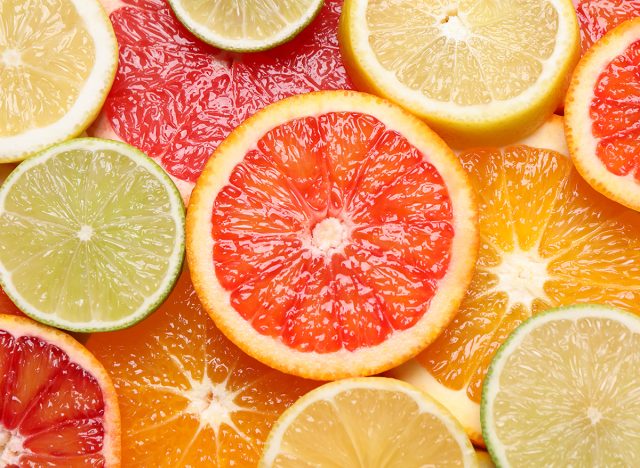
Azzaro highlights citrus fruits and their zest, especially grapefruit, as foods that may help support your body’s detoxification ability. They are rich in vitamin C, a vital micronutrient that enhances the body’s natural detoxification processes. Vitamin C is integral to producing glutathione, a compound that aids in the liver’s detoxification pathways.
These fruits also contain high amounts of water, which helps hydrate the body and promote the elimination of waste products. The flavonoids in citrus fruits can protect the liver, boosting its function and health.
Azzaro cautions that people should “use caution with grapefruit, as it interacts with many medications due to its effects on liver enzymes.”
Broccoli
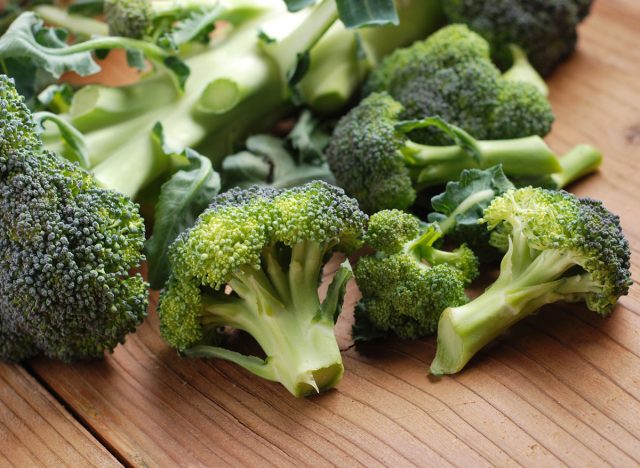
“Cruciferous vegetables (like broccoli, broccoli sprouts, cabbage, arugula, and radishes) support detoxification because they’re high in sulforaphane and indole-3-carbinol, as well as in fiber and other antioxidants, which support multiple phases of detoxification,” says Azzaro.
Sulforaphane is a compound that helps support an important phase of the body’s natural detoxification process (phase 2). Indole-3-carbinol (I3C) is a plant compound that is converted in the stomach to several compounds, including diindolylmethane (DIM). Both I3C and DIM are antioxidants and stimulators of natural detoxifying enzymes in the body.
Antioxidants protect the body from oxidative stress, while fiber helps move waste through the digestive system.
Berries
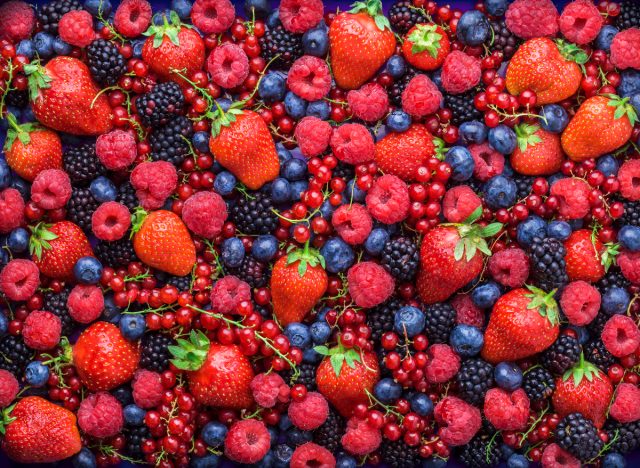
“Berries are another high-antioxidant, high-fiber category of foods that support detoxification, with blueberries and pomegranate topping the list,” Azzaro shares.
Both blueberries and pomegranates are impressive sources of antioxidants. Antioxidants play a role in combating oxidative stress, a key factor in the build-up of toxins in the body. By neutralizing harmful free radicals, antioxidants aid in detoxification.
Berries contain a unique plant pigment called anthocyanin (the compound that helps give these fruits those gorgeous deep hues). Anthocyanins may contribute to the activation of an important phase of the natural detoxification process, highlighting why these fruits can be included in a diet for those focused on supporting the detoxification process.
Onions and garlic
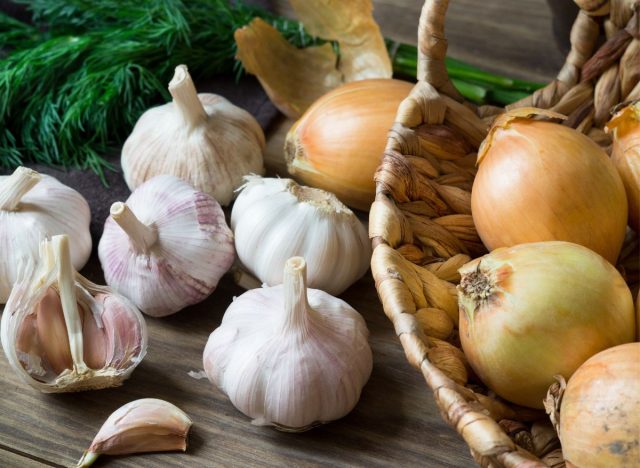
“Foods that are high in sulfur can also support Phase 2 detoxification,” says Azzaro. She describes high-sulfur foods as “stinky” foods, aka foods that have a pungent scent like onions and garlic. She also includes egg yolks and cruciferous vegetables in the sulfur foods list.
Eating sulfur-rich foods may increase the body’s glutathione level. Glutathione is an antioxidant that is involved in the body’s natural detoxification process, helping the body rid itself of certain toxins.
In addition, garlic and onions contain allicin, a compound that may support liver health.
Nuts
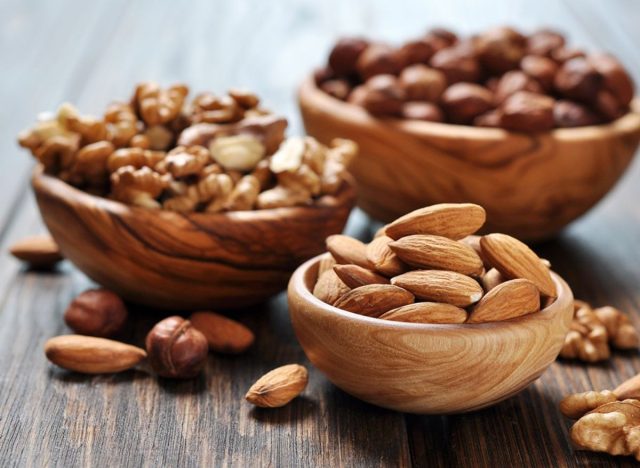
Nuts are an excellent food to incorporate into a detox process-supporting diet. They are teeming with nutrients that support the body’s natural detoxification process, such as fiber, which aids digestion and promotes the elimination of toxins through the digestive tract.
Nuts are also high in antioxidants like vitamin E, which can help to neutralize harmful free radicals in the body. Additionally, they contain essential healthy fats and amino acids, particularly arginine, glutathione, and methionine, which may support liver health. Furthermore, nuts are a source of plant-based proteins. Azzaro notes “We need enough protein to be able to make the enzymes required for detoxification.”
Flaxseeds
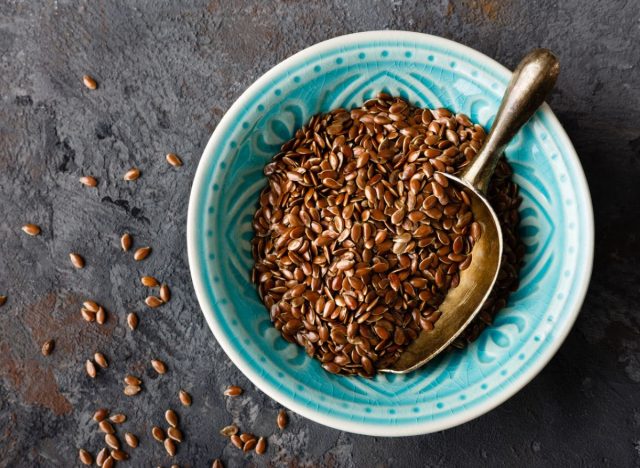
These tiny seeds pack a nutritional punch, being a source of lignans and soluble fiber, compounds that “can bind to excess hormones in the gut and help your body remove them through stool,” says Azzaro.
Lignans are a specific group of chemical compounds found in plants, classified as polyphenols. They are most notably present in flaxseeds, but can also be found in other seeds, grains, and fruits and vegetables.
Pro tip: grind your flaxseed before eating them to ensure your body can utilize all of the compounds found in these tiny seeds. The protective shell of flaxseeds may prevent the absorption of the nutritional benefits they offer.
Turmeric
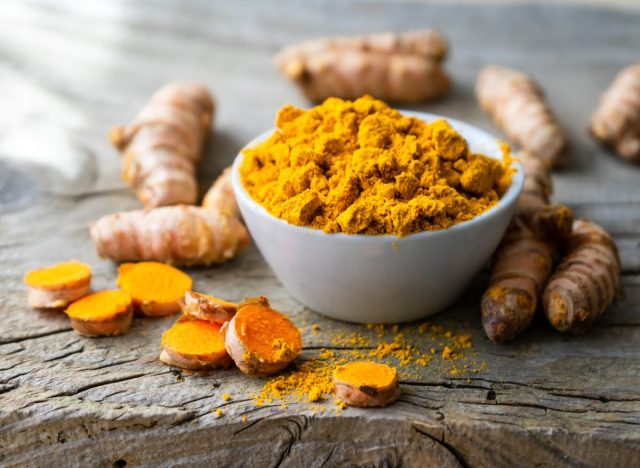
Turmeric, a vibrant yellow spice, is another potent detoxifying food. The active compound in turmeric, curcumin, has powerful anti-inflammatory and antioxidant properties. These characteristics make it excellent for detoxification, as it aids in protecting the liver, a critical organ for toxin removal.
Curcumin may also stimulate the production of glutathione, an antioxidant that the body uses to support the detoxification process.
Watermelon
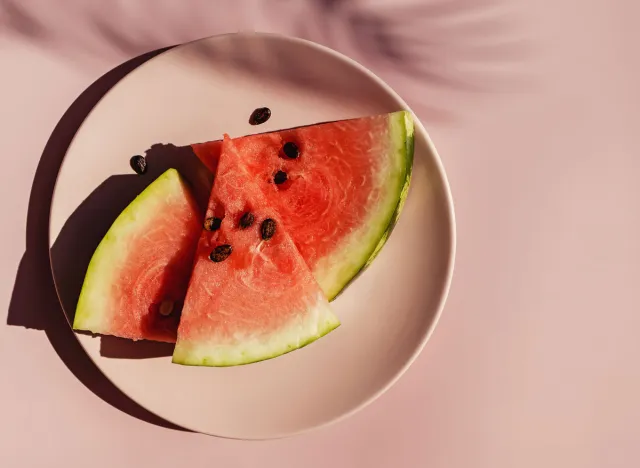
Watermelon is a refreshing fruit composed of over 90% water, which aids in cleansing the body and flushing out toxins through the urinary system. In addition, watermelon is a source of citrulline, an amino acid that plays a positive role in the urea cycle (the process of converting ammonia into urea before being excreted in the urine).
Plus, it’s packed with essential nutrients like vitamins A, C, and B6, along with potent antioxidants lycopene and beta-carotene. These antioxidants help to neutralize harmful free radicals in the body, supporting overall health and wellness.
Cranberries
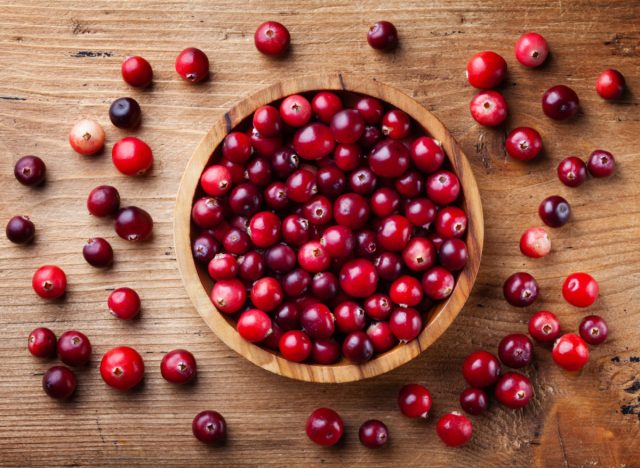
Your kidneys play a pivotal role in your body’s ability to get rid of toxins in different ways. Therefore, maintaining kidney health is a key part of supporting your body’s detoxification abilities.
Cranberries are renowned for their supportive role in kidney health. They contain a unique type of antioxidant known as proanthocyanidins, which help prevent harmful bacteria from adhering to the urinary tract walls, thereby reducing the risk of urinary tract infections. Additionally, cranberries possess anti-inflammatory and antioxidant properties.
Water
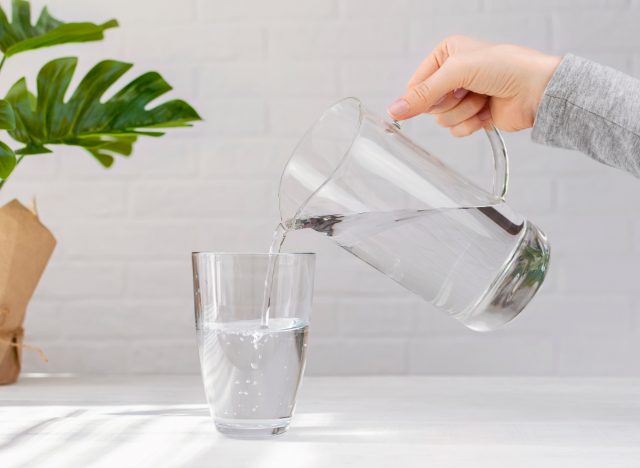
Yes, we know that water isn’t technically a food. But consuming enough water is incredibly important when trying to support your body’s ability to detoxify (aka rid itself of certain toxins). “We need enough water to make toxins water soluble so they can be disposed of in our urine and stool,” says Azzaro.
- Source: Tram NK, McLean RM, Swindle-Reilly KE. Glutathione Improves the Antioxidant Activity of Vitamin C in Human Lens and Retinal Epithelial Cells: Implications for Vitreous Substitutes. Curr Eye Res. 2021 Apr;46(4):470-481. doi: 10.1080/02713683.2020.1809002. Epub 2020 Aug 24. PMID: 32838548.
- Source: Mahmoud AM, Hernández Bautista RJ, Sandhu MA, Hussein OE. Beneficial Effects of Citrus Flavonoids on Cardiovascular and Metabolic Health. Oxid Med Cell Longev. 2019 Mar 10;2019:5484138. doi: 10.1155/2019/5484138. PMID: 30962863; PMCID: PMC6431442.
- Source: Yoshida K, Ushida Y, Ishijima T, Suganuma H, Inakuma T, Yajima N, Abe K, Nakai Y. Broccoli sprout extract induces detoxification-related gene expression and attenuates acute liver injury. World J Gastroenterol. 2015 Sep 21;21(35):10091-103. doi: 10.3748/wjg.v21.i35.10091. PMID: 26401074; PMCID: PMC4572790.
- Source: https://www.sciencedirect.com/topics/medicine-and-dentistry/indole-3-carbinol#:~:text=Indole%2D3%2Dcarbinol%20(I3C)%20is%20a%20phytochemical%20found,detoxifying%20enzymes%20in%20the%20body.
- Source: Lobo V, Patil A, Phatak A, Chandra N. Free radicals, antioxidants and functional foods: Impact on human health. Pharmacogn Rev. 2010 Jul;4(8):118-26. doi: 10.4103/0973-7847.70902. PMID: 22228951; PMCID: PMC3249911.
- Source: Shih PH, Yeh CT, Yen GC. Anthocyanins induce the activation of phase II enzymes through the antioxidant response element pathway against oxidative stress-induced apoptosis. J Agric Food Chem. 2007 Nov 14;55(23):9427-35. doi: 10.1021/jf071933i. Epub 2007 Oct 13. PMID: 17935293.
- Source: Moore LE, Brennan P, Karami S, Hung RJ, Hsu C, Boffetta P, Toro J, Zaridze D, Janout V, Bencko V, Navratilova M, Szeszenia-Dabrowska N, Mates D, Mukeria A, Holcatova I, Welch R, Chanock S, Rothman N, Chow WH. Glutathione S-transferase polymorphisms, cruciferous vegetable intake and cancer risk in the Central and Eastern European Kidney Cancer Study. Carcinogenesis. 2007 Sep;28(9):1960-4. doi: 10.1093/carcin/bgm151. Epub 2007 Jul 7. PMID: 17617661.
- Source: Pizzorno J. Glutathione! Integr Med (Encinitas). 2014 Feb;13(1):8-12. PMID: 26770075; PMCID: PMC4684116.
- Source: Panyod S, Wu WK, Ho CT, Lu KH, Liu CT, Chu YL, Lai YS, Chen WC, Lin YE, Lin SH, Sheen LY. Diet Supplementation with Allicin Protects against Alcoholic Fatty Liver Disease in Mice by Improving Anti-inflammation and Antioxidative Functions. J Agric Food Chem. 2016 Sep 28;64(38):7104-13. doi: 10.1021/acs.jafc.6b02763. Epub 2016 Sep 19. PMID: 27584700.
- Source: Dietary fiber: Essential for a healthy diet. (2022, November 4). Mayo Clinic. https://www.mayoclinic.org/healthy-lifestyle/nutrition-and-healthy-eating/in-depth/fiber/art-20043983#:~:text=Dietary%20fiber%20increases%20the%20weight,and%20adds%20bulk%20to%20stool.
- Source: https://www.hsph.harvard.edu/nutritionsource/vitamin-e/#:~:text=Vitamin%20E%20is%20a%20fat,”—that%20can%20damage%20cells.
- Source: Lee DY, Kim EH. Therapeutic Effects of Amino Acids in Liver Diseases: Current Studies and Future Perspectives. J Cancer Prev. 2019 Jun;24(2):72-78. doi: 10.15430/JCP.2019.24.2.72. Epub 2019 Jun 30. PMID: 31360687; PMCID: PMC6619856.
- Source: Peng Y, Ao M, Dong B, Jiang Y, Yu L, Chen Z, Hu C, Xu R. Anti-Inflammatory Effects of Curcumin in the Inflammatory Diseases: Status, Limitations and Countermeasures. Drug Des Devel Ther. 2021 Nov 2;15:4503-4525. doi: 10.2147/DDDT.S327378. PMID: 34754179; PMCID: PMC8572027.
- Source: Biswas SK, McClure D, Jimenez LA, Megson IL, Rahman I. Curcumin induces glutathione biosynthesis and inhibits NF-kappaB activation and interleukin-8 release in alveolar epithelial cells: mechanism of free radical scavenging activity. Antioxid Redox Signal. 2005 Jan-Feb;7(1-2):32-41. doi: 10.1089/ars.2005.7.32. PMID: 15650394.
- Source: Kaore SN, Amane HS, Kaore NM. Citrulline: pharmacological perspectives and its role as an emerging biomarker in future. Fundam Clin Pharmacol. 2013 Feb;27(1):35-50. doi: 10.1111/j.1472-8206.2012.01059.x. Epub 2012 Jul 31. PMID: 23316808.
- Source: Pirayesh Islamian J, Mehrali H. Lycopene as a carotenoid provides radioprotectant and antioxidant effects by quenching radiation-induced free radical singlet oxygen: an overview. Cell J. 2015 Winter;16(4):386-91. doi: 10.22074/cellj.2015.485. Epub 2015 Jan 13. PMID: 25685729; PMCID: PMC4297477.
- Source: Rauf A, Imran M, Abu-Izneid T, Iahtisham-Ul-Haq, Patel S, Pan X, Naz S, Sanches Silva A, Saeed F, Rasul Suleria HA. Proanthocyanidins: A comprehensive review. Biomed Pharmacother. 2019 Aug;116:108999. doi: 10.1016/j.biopha.2019.108999. Epub 2019 May 27. PMID: 31146109.
- Source: Nemzer BV, Al-Taher F, Yashin A, Revelsky I, Yashin Y. Cranberry: Chemical Composition, Antioxidant Activity and Impact on Human Health: Overview. Molecules. 2022 Feb 23;27(5):1503. doi: 10.3390/molecules27051503. PMID: 35268605; PMCID: PMC8911768.